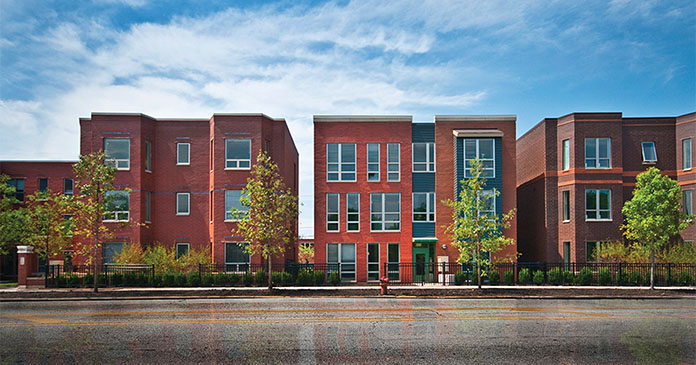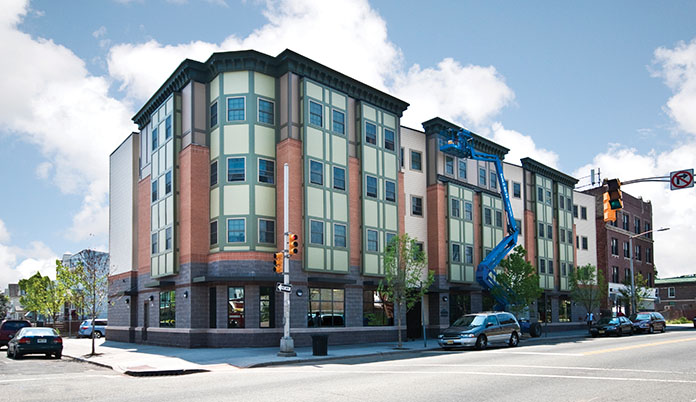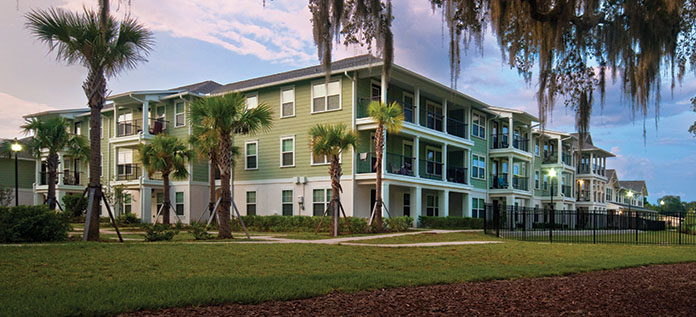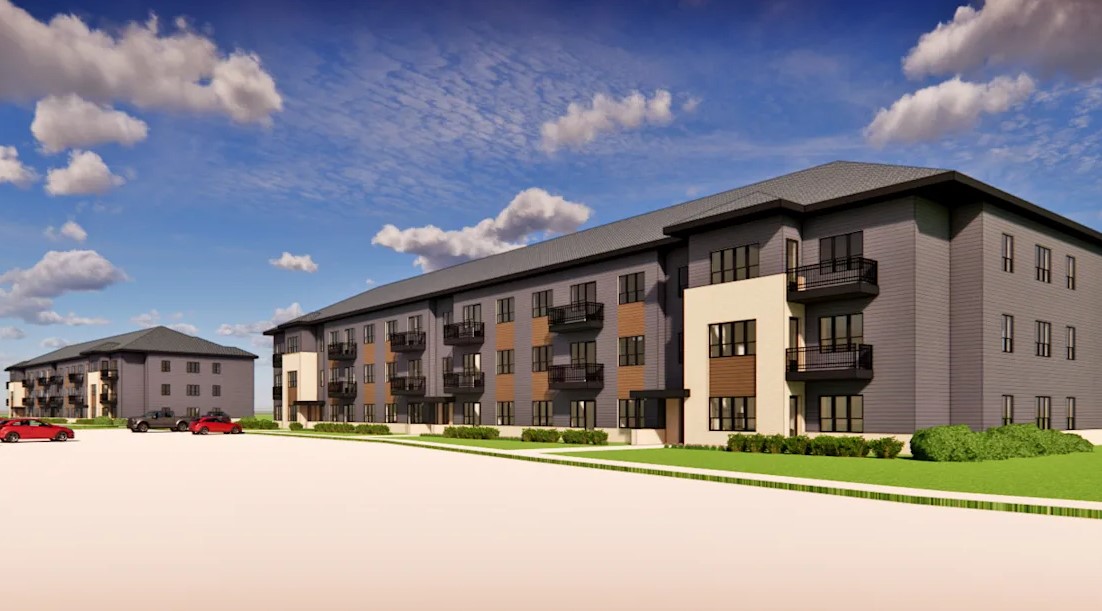
Judges for the National Home Builders Association (NAHB) Multifamily’s Pillars of the Industry awards that were delivered online this year look for outstanding performance in finance as one of the criteria for the year’s best developer. The Michaels Organization’s freedom from debt fits that imperative.
“We are a debt-free company. We provide all our upfront money and we don’t borrow from banks or anyone else. So, that puts us in a very enviable position,” said Michael Levitt , founder and CEO of the 35-year-old real estate company, who got into the housing business in 1954 with his home building father, and founded his own company in 1973.
The Marlton, N.J.-based organization’s six companies work hand-in-hand to shepherd complex public/private partnership deals from the RFP to reality, syndicate its tax credits and oversee 41,200 apartments in a portfolio that extends from the farthest eastern reaches of this country on St. Croix in the Virgin Islands to about as far west as you can go and still be in the United States—Hawaii—a market Michaels entered in September. The portfolio has a total annual rent roll of $388 million dollars.
“We collect over a million dollars a day in rents,” Levitt said, of the company that has grown through gigantic HOPE VI renovations of dilapidated public housing projects in the early half of this decade, adding redevelopment and new construction of thousands more dwelling units at military bases across the country in the second half. And, early this year, Michaels added student housing to its list of public/private partnerships in a deal with Rutgers University in Camden, N.J.
The company also is growing through transactions like the September acquisition of the Lodi, Calif.,-based PAM Companies’ general partnership interest, expanding Michaels’ Golden State portfolio by 4,000 units in 72 communities and adding a new source of government funding—the U.S. Department of Agriculture’s Farmer’s Home Loan Program—to the multitude of affordable housing financing tools in its mixed bag of funding mechanisms.
“That’s a new field for us,” Levitt said in November after returning from a whirlwind tour of his assets in The Michaels Organization’s growing portfolio on the western edge of the country, where Michaels’ management company, Interstate Realty Management, now is overseeing almost 100 properties throughout California and Nevada. And, with the addition of the $316 million redevelopment of Kuhio Park Terrace and Kuhio Homes in Honolulu that is targeted to close by the end of 2010, the company has a presence in 31 states.
“As we expand into new states, that means we need more staff to handle the contingent growth of our organization,” said Bob Greer, president of Michaels Development Company, who was a director of the Pennsylvania Housing Finance Agency during the early days of government financing of affordable housing, when he met Levitt and joined him in the real estate business 35 years ago.
“The biggest challenge probably is finding enough qualified people and that means searching for people that will fit into our structure, our family, and help us with the programs we’ve taken responsibility for,” he said. At a time when many multifamily companies were laying people off, Michaels was able to take advantage of that. “We’ve brought many people on-staff, who used to be employed by our friendly competitors,” he said.
“When I joined Mike, there were only four of us and now there are more than 2,500 people working for The Michaels Organization,” said Greer, whose job as president of the development business includes acting as the public face of the company, representing Michaels on national boards and trade associations. He also leads Michaels’ client relationship efforts and frequently meets with senators, governors, mayors and other public officials to understand their housing agendas and advocate for affordable housing programs.
Greer does a lot of public speaking and it isn’t unusual for his compatriots at conferences to approach him at the end of a meeting, asking if Michaels might be able to help them out with projects where they’re having problems meeting tax credit requirements in development or management or military housing deals that have proven too complicated.

“That’s how these opportunities happen,” he said of the PAM deal, the acquisition of the Indiana-based Sterling Group’s 2,000-unit portfolio of low-income housing tax credit (LIHTC) deals in Michigan and Indiana and the LIHTC deals Global Premier Development, Inc. had successfully funded in California but needed help to get the units built and into service by the tax credit program’s deadline.
“We’re not advertising for it, certainly, but, when people hear that we’re growing, they think we might be interested in solving their problems and frequently that means stepping into the general partnership and taking over management,” he said.
A veteran of affordable financing, conversant with all manner of tax credits, government bonds and, most recently federal stimulus funding, Greer was appointed vice chair of NAHB’s Housing Credit Group at the beginning of the year and will assume chairman’s hip of the group in January 2011. This is the second time he has been tapped to chair the group that he says is most strongly focused on keeping the tax credit programs safe and easier to understand and acquire.
Since its inception more than 20 years ago, low-income housing tax credit program opportunities have spread ever more thinly, including more builders, while reducing the size of individual awards from 200-units’ worth to more like 70, prompting Michaels to add the U.S. Department of Housing and Redevelopment’s HOPE VI program, created to rebuild severely distressed, old public housing projects to its roster of specialties.
And, when reviewing the HOPE VI program and its requirements, some eight years ago, Greer also heard from his fellow multifamily builders about the military’s ongoing efforts to privatize housing on U.S. bases.
Because HOPE VI was complicated by the partnership required with state and local public housing authorities and the military deals involved thousands of units, many of his peers chose the military route, even though eligibility for those deals required previous building of a project of at least 1,000 units.
In 2004, Michaels decided that its deep experience as a housing partner to state and local housing agencies and HUD could be just the right springboard to become a partner with the U.S. Department of Defense, so they applied to rejuvenate and rebuild more than 1,500 dwelling units at Ft. Leavenworth and were selected for the job by the U.S. Army five years ago. Since then, Michaels Military Housing has added military housing makeovers at a couple more Arizona Army bases and has won management contracts with two Air Force housing and is currently in the running for one of the few military base housing privatization deals left to be awarded.
With 54 projects in development and a pipeline of 11,000 units today, Michaels Development defied the devastating economic downturn, experiencing the company’s best years ever in 2009 and 2010. In addition to 20 HOPE VI communities underway, the burgeoning Michaels Military Housing division recently took over the management of 4,214 units at Fort Benning in Georgia.
Michaels Development Company is working on seven developments using $43 million in federal stimulus funds, awarded this year under the American Recovery and Reinvestment Act that was approved in February 2009. Eight million of those dollars will go to the rehab of the 71-year-old Frank Berry Courts, which houses more than 100 families, into energy efficient apartments. That project broke ground in October. “When we started it in Meridian, Miss., 350 people showed up for the first construction meeting. So, in the affordable housing business, the money is putting people to work,” Levitt proudly reported.
But, perhaps the most important ingredient in the mix that makes The Michaels Organization an award-winning company is love.
“Some people have been with me 30 years. Half the people have probably worked here 15 years or more because everybody loves it and it’s a family,” said The Michaels Organization’s founder, adding that he is so proud of the talented team he has been able to assemble and their commitment to “doing well by doing good.”
“We have really been able to give back to society by providing housing for thousands of people who would not have adequate housing if we have not done our job,” Levitt said.

Author Peggy Shaw













